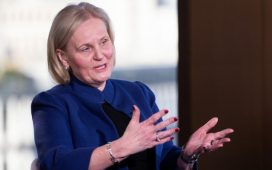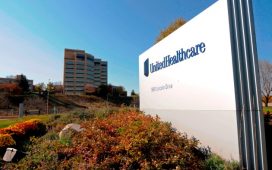Shares in Aviva, the UK’s biggest insurer, jumped almost 10% after reports that it could be the target of a takeover by a foreign buyer.
Its shares rose 9.5% to 425.12p, having hit 428.3p at one stage, valuing the company at £11.6bn.
The markets blog Betaville and the Times newspaper reported that Aviva had attracted takeover interest from several international rivals.
It has previously been linked with Germany’s biggest insurer, Allianz, while Canada’s Intact Financial Corporation and the Danish insurer Tryg are reportedly considering their options, along with an American insurer, with a £6-a-share proposal mooted, according to the Times.
There had been some discussions with suitors, a City source told the Guardian. Aviva declined to comment.
Intact, Canada’s largest property and casualty insurer, has been on a buying spree in the UK, snapping up Direct Line’s brokered commercial business for £520m last month. With Tryg, the largest general insurer in Scandinavia, the Canadian firm bought the RSA Insurance Group, the owner of the More Than brand, in a £7.2bn deal in 2021, which resulted in a breakup of the 300-year-old company.
Aviva’s share price has risen by about 55% since Amanda Blanc became chief executive in July 2020, although it is down 5.5% so far this year.
Blanc has sold off most overseas businesses to focus on the UK, the Republic of Ireland and Canada. Aviva posted an 8% rise in operating profit to £715m for the first half of the year, and Blanc has talked about “big opportunities” in expanding private health cover in the UK as NHS waiting lists hit a record high.
Aviva bought the American insurer AIG’s UK protection business for £460m last week, Blanc’s biggest deal so far, and is the preferred bidder with partners to build a large cancer research and treatment campus in Sutton, south London.
The activist investor Cevian Capital sold down its entire stake in Aviva in May, saying Blanc and her team had done an “excellent” job in improving the company’s fortunes. This meant Cevian was no longer “causing mischief”, and removed an obstacle to a potential takeover, analysts said.
UK equities are relatively cheap because of a combination of factors, including cheaper sterling, political instability, and exodus of companies and investors from the London market and pessimism about the country’s poor growth prospects in comparison with other economies.
It was on course to be the second-worst performer in the G7 group of large economies this year after Germany, the International Monetary Fund predicted in June.
after newsletter promotion
Russ Mould, an investment director at AJ Bell, said: “Aviva is left as one of many stocks on the UK market looking unloved but still offering the potential for long-term value generation.
“The business is forecast to have strong free cashflow and excess capital, and its valuation is cheap. It has slimmed down in recent years to focus on the stronger parts of the group and there is now an opportunity to increase its position in bulk annuities, which looks like a more prosperous market thanks to higher gilt yields.”
Mould said one of the obvious times to buy a company was when it had made solid progress with a turnaround programme as that de-risked the investment case.
He added: “Aviva has cast off the shackles of being a conglomerate and sharpened its focus as a result of asset disposals and a new impetus to grow, making it a stronger business. Naturally, that makes it more appealing to a would-be suitor.”
Aviva offers pensions, life and health insurance, car, home and travel cover and has 15.5 million customers in the UK. It is the country’s largest life insurer, with a 20% share of the market. In Canada, it is the second-biggest insurer, with a range of general insurance products and an 8% market share.











